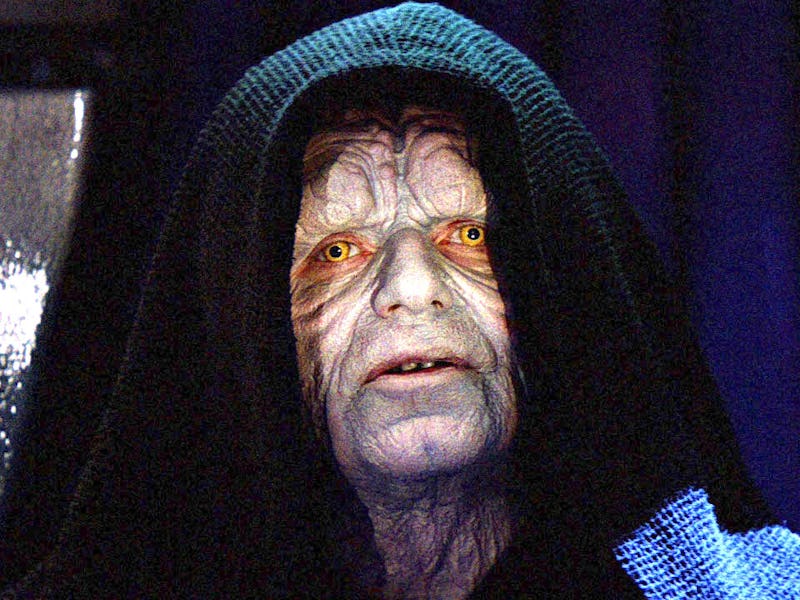If Palpatine is a clone, what's Rey? A bioethicist explains
"It's a question of the significance of those relationships."

The newest development in the perpetually confusing question of Rey's family tree, blissfully, has nothing to do with Force ghosts. This time, we're (somewhat) rooted in scientific realism. The bioethics of cloning, combined with a recent reveal in a novelization of The Rise of Skywalker tell us a lot about Rey's parentage, and what it means.
As Inverse previously reported, the novelization of The Rise of Skywalker revealed that Rey's father is actually a "not-quite identical," "failed" clone of Emperor Palpatine. Given that the Palpatine who appears in The Rise of Skywalker was also a clone, this raises a number of complicated questions about Rey's family tree and how it connects to the Emperor.
So who is Rey to Palpatine? To answer that, we need to backtrack and uncover who this "failed clone" (Rey's dad) is to Palpatine. Is he a son? A brother? Simply another carbon-copy? These questions are dizzying in the Star Wars universe, but they're a bit more tangible if considered in context with our own reality.
To figure this out, Inverse asked bioethicist Lawrence Nelson at Santa Clara University to help interpret who Palpatine might be to Rey, who in turn delivered a galaxy-brain interpretation.
"I'm not sure there's a single answer from the moral point of view," Nelson says.
Instead, he urges us to consider the more important question: Why do the genetics even matter?
"That's more of a matter of legal and social convention," he says. "It's a question of the significance of those relationships."
Are clones part of the family?
We've yet to clone a human (and probably won't anytime soon due to serious ethical and procedural issues). But bioethicists have considered the strange way that human cloning affects how we see ourselves and our families. As of now, the answers are not terribly clear-cut.
For those dedicated to a solid answer, Nelson is adamant that there isn't one. Still, the biology of cloning itself may help clarify things a tiny bit.
In real life, the definition of cloning is creating a new organism that is genetically identical to another organism. The most famous example of cloning to date is still probably Dolly the sheep, who was born in 1996 in Scotland thanks to a method called somatic cell nuclear transfer.
Somatic cell nuclear transfer is a procedure that takes the nucleus of a cell from one individual and artificially implants that nucleus into an egg. Once those cells start dividing, they're implanted into a surrogate mother. That's how Dolly and her progeny, Debbie, Denise, Diana, and Daisy, were born.
Who is this guy, again?
Genetically, these clones share the vast majority of their DNA with the donor — though they're not perfect genetic copies. Most of the DNA in a cell is housed in the nucleus but some DNA exists outside the nucleus, in the mitochondria (the organs within a cell that help produce energy). That means that clones still have a small amount of mitochondrial DNA that comes from the egg donor, or the genetic mother.
This technical explanation is to say that even clones aren't perfect replicas of one another in a number of ways. A clone and the person they are cloned from will have different mothers than the original donor, they'll have different life experiences and be raised in different environments, which will ultimately influence how their genes are expressed. Taken together, says Nelson, each clone is their own person for reasons that go beyond genetic hair-splitting:
"They’re obviously a separate individual, born at a separate time from a different mother, in a different environment, both in the womb and outside of the womb," he says. "Once they’re born alive, they’re their own individual, it doesn’t matter that they were cloned from someone else’s DNA."
So ... are they related?
What does that mean for Rey's family tree? It suggests that Rey's father isn't simply Palpatine put through a genetic copy-machine. Rey's father is, well, Rey's father – a cloned individual born in a different time, to a different mother. He likely has slightly different genetics anyway. To add to that, according to the novelization, he also wasn't Force-sensitive — so that's yet another way he is differentiated from Palpatine.
“It's what actually connects the people, it's not their biology.”
The question then becomes: What is Rey's father to Palpatine himself? The speculation is that he would be Palpatine's son – that's the word used in the novelization (given the age differences between the two characters, the assumption feels fair.) And genetically speaking, this clone (Rey's dad) would share far more DNA with his "father" (Palpatine) than your average son, who only shares half his genes with each parent.
But from the novelization, it suggests that Rey's dad is a "son" of Palpatine. Though it seems as if there wasn't a terribly familial relationship between Rey's dad and Palpatine, regardless of the genetic connections between the two. The book states that "Palpatine could not even bear to look upon such disappointing ordinariness."
Those familial ties, or lack thereof, tell us much more than genetics ever could, says Nelson.
"It's what actually connects the people, it's not their biology. There are plenty of people who had terrible parents or don't like their siblings. That's not the single most important factor here," he says.
Biological parentage seems to have taken on increased importance in the interim between The Last Jedi and The Rise of Skywalker. But bioethically speaking, it doesn't appear to be as important as the family you choose.
And — just a reminder here — the Palpatine we see in The Rise of Skywalker is also a clone, so that guy is definitely not Rey's grandpa, despite his insistence that she become "what your grandfather could not."